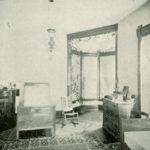State insane asylums are usually thought to be a little (or a lot) worse than private institutions, and that is probably true in many cases. Private asylums had a bit more freedom in accepting patients and in hiring staff, and that was often reflected in the their general atmosphere and the treatment of patients. However, private institutions could have their own problems.
In his groundbreaking book, A Mind That Found Itself, Clifford Beers stated that “private institutions are prone to shift their troublesome cases to state institutions.” This probably helped the private asylums cull out their most troublesome or annoying patients, but the practice sometimes helped those who were shifted. Beers’ had just entered his third institution, a state asylum, after being transferred from a private one.
“At the private institution, I had been classed as a raving maniac,” Beers said. He was consequently put into a strait jacket upon arrival at the state asylum, but evidently, little medical information had been transferred with him. When Beers behaved well, attendants took off the strait jacket. He attended church services, and later, a dance.
“Yet on either of these days, had I been in the private institution which I had recently left, I should have occupied a cell and worn a strait-jacket,” he wrote. Being transferred to a new place could be helpful if it gave a patient a fresh start. Too often, a patient who got on the wrong side of an asylum’s attendants never got a second chance. Attendants seldom wanted to let down their guard once a patient had been troublesome, but being treated with pre-emptive coercion and mistrust seldom helped a patient recover.








